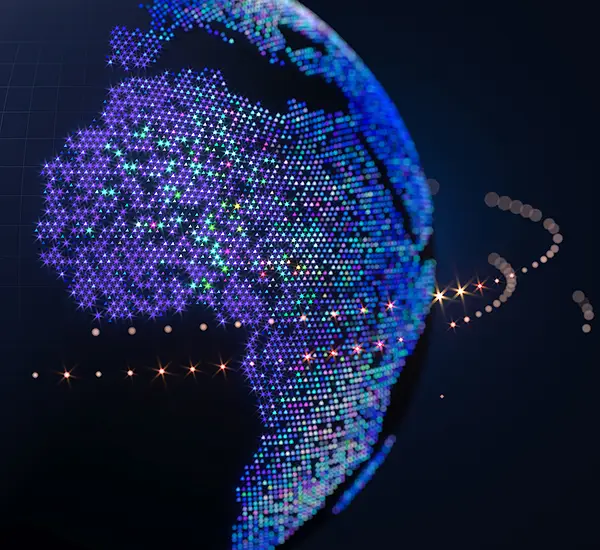Using cutting-edge statistical methods to examine the effects of internet connectivity on growth and development
Objective:
Understand the impacts of subsea cables, the global backbone of internet connectivity, on economic growth and development in Africa.
Approach:
Create country-specific analyses using complementary econometric methods that offer the most robust, reliable, and accurate way to estimate causal effects. The results detail how subsea cables impact likelihood of employment and increase in gross domestic product (GDP). We also estimated the potential future impact of 2Africa. We also estimate that 2Africa will have a 26.2 to 36.4 billion USD (at PPP) impact on Africa’s GDP within 2 to 3 years of becoming operational in 2023/4.
Impact:
There are a range of positive impacts, from an over 8 percent increase in employment in areas that are connected to fiber to a 19 percent increase in GDP per capita for countries like the DRC. This first-of-its-kind research further details the important role internet infrastructure plays in economic development outcomes.
The importance of high-quality, reliable internet connectivity and infrastructure is more apparent now than ever, as the heavier reliance on remote work and online communication during the COVID-19 pandemic drives a dramatic surge in global internet usage. And yet, nearly half the world remains unconnected.
Submarine fiber optic cables (“subsea cables”) are among the most important components of the internet’s infrastructure. They are the global internet backbone, connecting countries, carrying communications, and enabling commerce and education. The importance of connectivity to economic growth is well established, but rigorous studies quantifying the impacts are not available for many countries.
RTI completed a series of studies, in partnership with Facebook, that analyzed the economic impact of subsea cables and the improvement in connectivity they delivered on six countries in Sub-Saharan Africa. In close collaboration with African telecommunications experts, our team documented how improvements in connectivity catalyzed economic opportunity and growth in Nigeria, Democratic Republic of Congo, Kenya, South Africa, Mozambique, and Tanzania.
We also estimate that 2Africa, an ambitious new subsea cable project will catalyze a 26.2 to 36.9 billion USD economic impact within 2 to 3 years of becoming operational in 2023/4. This equivalent to 0.42 percent to 0.58 percent of Africa’s GDP at purchasing power parity. This 37,000 kilometer project will seamlessly connect Africa’s east and west coasts for the first time.
Highlights from our country-level studies include:
- In Democratic Republic of Congo, the subsea cable landing from 2012 led to an 8.2 percent increase in employment in fiber-connected areas and a 19 percent increase in GDP per capita nationally.
- Kenya has seen an 8.4 percent increase in skilled employment since TEAMS landed in 2009. About 30% of these jobs were new; 70% were lower skilled jobs that transitioned towards higher skilled ones.
- Mozambique experienced a 13.6 percent increase in employment for urban university-educated people, especially in Maputo.
- In Nigeria, improved connectivity resulted in a 7.8 percent increase in employment in connected areas. This means that for every 1 million people living in areas connected to terrestrial fiber, 78,000 additional people become employed.
- South Africa experienced a 6.1 percent increase in GDP per capita nationally by 2014 from the economic activity catalyzed by improved connectivity from cables landing in 2009. There was also a 2.2 percent increase in employment in areas connected to fiber infrastructure. These impacts are significant, and they signal that efforts to tackle affordability challenges are important for addressing inequity and ensuring that the economic benefits of connectivity are enjoyed by all.
- Tanzania saw an 18.7 percent increase in employment in select fiber-connected areas, but overall there were limited impacts on GDP or national indicators. Many people and businesses are not online in Tanzania. As such, the impacts are largely limited to select areas at present.
In many of these countries many people are not online. This is often because of an overall lack of infrastructure, service isn’t available, or people cannot afford service. As such, except for a couple of countries, there were not yet detectable national level impacts. Despite this, the evidence signals significant social and economic impact potential from addressing these barriers.
The research is powerful because it used advanced econometric techniques—difference-in-differences, synthetic controls, and simultaneous equations models—paired with local insights to document the impact that subsea cables and improved connectivity have had on economic development. The team looked at subsea cable landings over the past 6 to 10 years in each country, controlling for technology trends, population characteristics, and other important factors. These findings underscore the economic development imperative of accelerating the growth in connectivity in Sub-Saharan African countries.

Read the Reports
Our team used advanced econometric techniques to examine how improvements in Internet connectivity catalyzed economic opportunity and growth in six countries. We also analyzed the impact of 2Africa, an ongoing subsea cable project.

